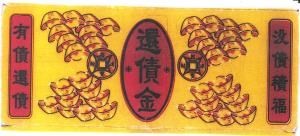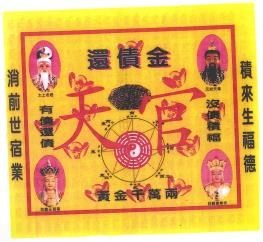- within Intellectual Property topic(s)
- with Senior Company Executives, HR and Finance and Tax Executives
- with readers working within the Accounting & Consultancy, Technology and Telecomms industries
This article looks at the recent decision by the Court of Appeal ("COA") Malaysia in Ooi Siew Bee (Trading under the Name And Style Syarikat Perniagaan Eng Leong) & 2 Ors v Zhu Ge Kong Ming Sdn Bhd & Anor (Civil Appeal No: W-02(IPCV)(W)-1598-08/2016).
In the given appeal ("Current Appeal"), the three (3) Appellants (also the Plaintiffs in the High Court proceedings) appealed against the decision of the High Court in which the court dismissed the Plaintiffs' application under section 45 of the Trade Marks Act 1976 ("TMA") to expunge the Respondent's trade marks. For convenience, the Appellants will be referred to as the Plaintiffs and the Respondent as the Defendant throughout this article.
The subject marks in dispute are the marks bearing the Chinese
characters ""Huan Zhai Jin" [![]() ] (which translates to mean "repay /
debts / gold or money") which are commonly found on prayer
papers used by the Chinese community for burning during religious
rituals ("Huan Zhai Jin Trade Marks"),
as reproduced below:
] (which translates to mean "repay /
debts / gold or money") which are commonly found on prayer
papers used by the Chinese community for burning during religious
rituals ("Huan Zhai Jin Trade Marks"),
as reproduced below:
 |
 |
High Court Proceedings
The main issue before the High Court was whether the Huan Zhai Jin trade marks were liable to be expunged pursuant to section 45(1) of the TMA for contravening sections 10(1)(c), (d), (e) and section 14 of the TMA.
The High Court ruled in favour of the Defendant for several
reasons. The Court found that the 3rd Plaintiff was
not an aggrieved person within the meaning of section 45(1)(a) of
the TMA, and as the Huan Zhai Jin Trade Marks have been registered
for more than 7 years, the Plaintiffs could not expunge a trade
mark on grounds outside of section 37 of the TMA, in which they
failed to adduce sufficient evidence. The High Court also found
that the Chinese characters "Huan Zhai Jin" [![]() ] were not common descriptive terms in the
Chinese language.
] were not common descriptive terms in the
Chinese language.
Previous Proceedings
Prior to the institution of this present suit by the Plaintiffs,
the Defendant had previously commenced actions of trade mark
infringement and passing off against the
2nd Plaintiff in this instant case
("Previous Proceedings"). The
Defendant's claim was dismissed by the High Court as the Court
found that the Chinese characters "Huan Zhai Jin" [![]() ] were common descriptive words in the
Mandarin language and are not exclusive to the Defendant alone. An
appeal was made to the COA but was ultimately dismissed, and leave
to the Federal Court was refused.
] were common descriptive words in the
Mandarin language and are not exclusive to the Defendant alone. An
appeal was made to the COA but was ultimately dismissed, and leave
to the Federal Court was refused.
Court of Appeal Proceedings
The first issue in the Current Appeal was whether the 3rd Plaintiff was an aggrieved person within the meaning of section 45(1)(a) of the TMA to apply for the expungement of the Huan Zhai Jin trade marks. The COA concurred with the Judicial Commissioner that the 3rd Plaintiff, being the Association of Manufacturers and Retailers of Chinese Prayer Goods in Penang, had not partaken in any dealings of Chinese prayer materials. Accordingly, the 3rd Plaintiff had not used the Huan Zhai Jin trade marks in the course of trade and failed to satisfy the definition of "aggrieved persons".
The second issue in the Current Appeal was whether the findings
of the COA in the Previous Proceedings, that the Chinese words
"Huan Zhai Jin" [![]() ] were common words used in relation to
the burning of prayer papers, should be caught by the doctrine
of res judicata.
] were common words used in relation to
the burning of prayer papers, should be caught by the doctrine
of res judicata.
In delivering its decision, the COA noted that:
"...the cause of action in estoppel is founded upon the principle that there must be finality to litigation. It applies to the issue raised and also to matters decided in the earlier proceedings. But it only applies when the cause of action or the subject matter of the disputes in the earlier proceeding is similar to that in the later proceedings."
The COA found that the factual issue in the Current Appeal also
related to the issue of whether the three Chinese characters
"Huan Zhai Jin" [![]() ] were common descriptive words.
Accordingly, the COA held that the crux of the matter had been
decided by the same Court in the Previous Proceedings. Therefore,
the Current Appeal was bound by the decision of the Previous
Proceedings by virtue of res judicata. As such, the
3rd Plaintiff's appeal was dismissed while the
1st and 2nd Plaintiffs' appeals
were allowed, allowing for the Huan Zhai Jin trade marks to be
expunged.
] were common descriptive words.
Accordingly, the COA held that the crux of the matter had been
decided by the same Court in the Previous Proceedings. Therefore,
the Current Appeal was bound by the decision of the Previous
Proceedings by virtue of res judicata. As such, the
3rd Plaintiff's appeal was dismissed while the
1st and 2nd Plaintiffs' appeals
were allowed, allowing for the Huan Zhai Jin trade marks to be
expunged.
Conclusion
The decision of this Appeal is welcome as the following observations can be made:
- A party claiming to be an "aggrieved person" should have used, or have a genuine intention to use, the mark similar to the mark the party is seeking to expunge in his course of trade, and that party's interest must be substantially affected by the registered trade mark;
- Res judicata can apply when the factual issue or subject matter of a current action and a previous related proceeding is the same or similar, even if the causes of action are premised on different legislative provisions; and
- The court is mindful of the need to preserve the interest of
the wider public so that common words, such as "Huan Zhai
Jin" [
 ], are free from possession of any party.
Therefore, common religious words are unlikely to be accepted as
trade marks.
], are free from possession of any party.
Therefore, common religious words are unlikely to be accepted as
trade marks.
The content of this article is intended to provide a general guide to the subject matter. Specialist advice should be sought about your specific circumstances.


